Nibali: Froome wouldn't have won his four Tours without Team Sky
Italian talks about his Grand Tour rivals and his season in an exclusive interview with Cyclingnews
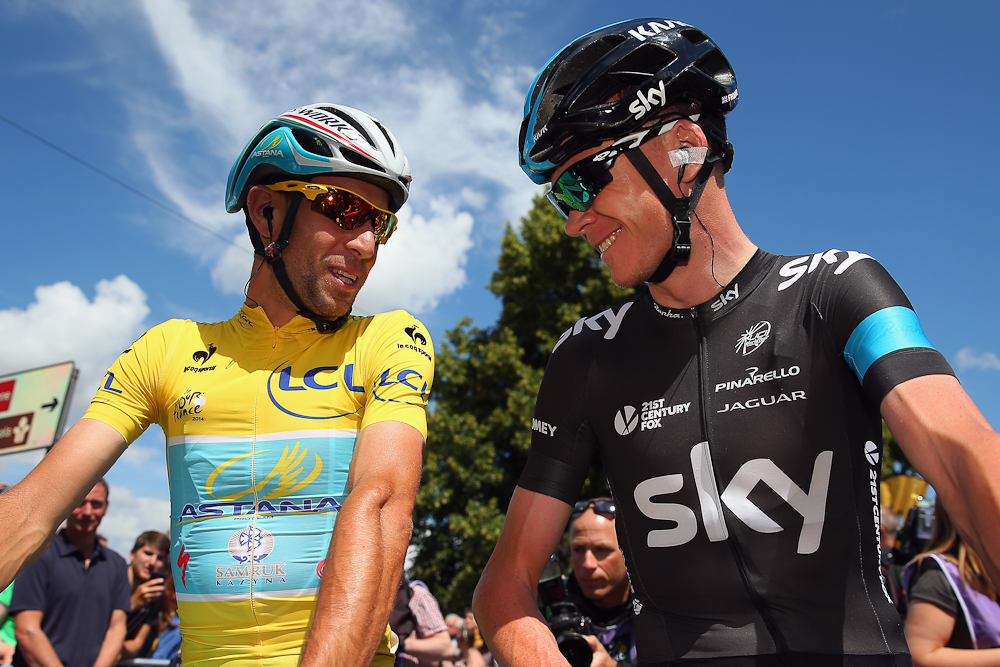
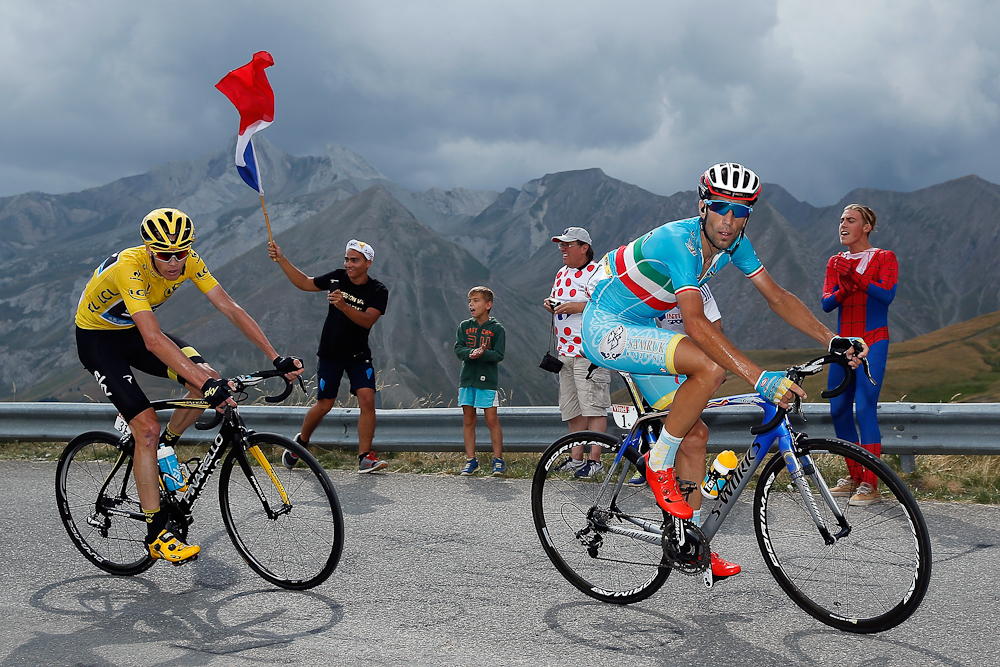
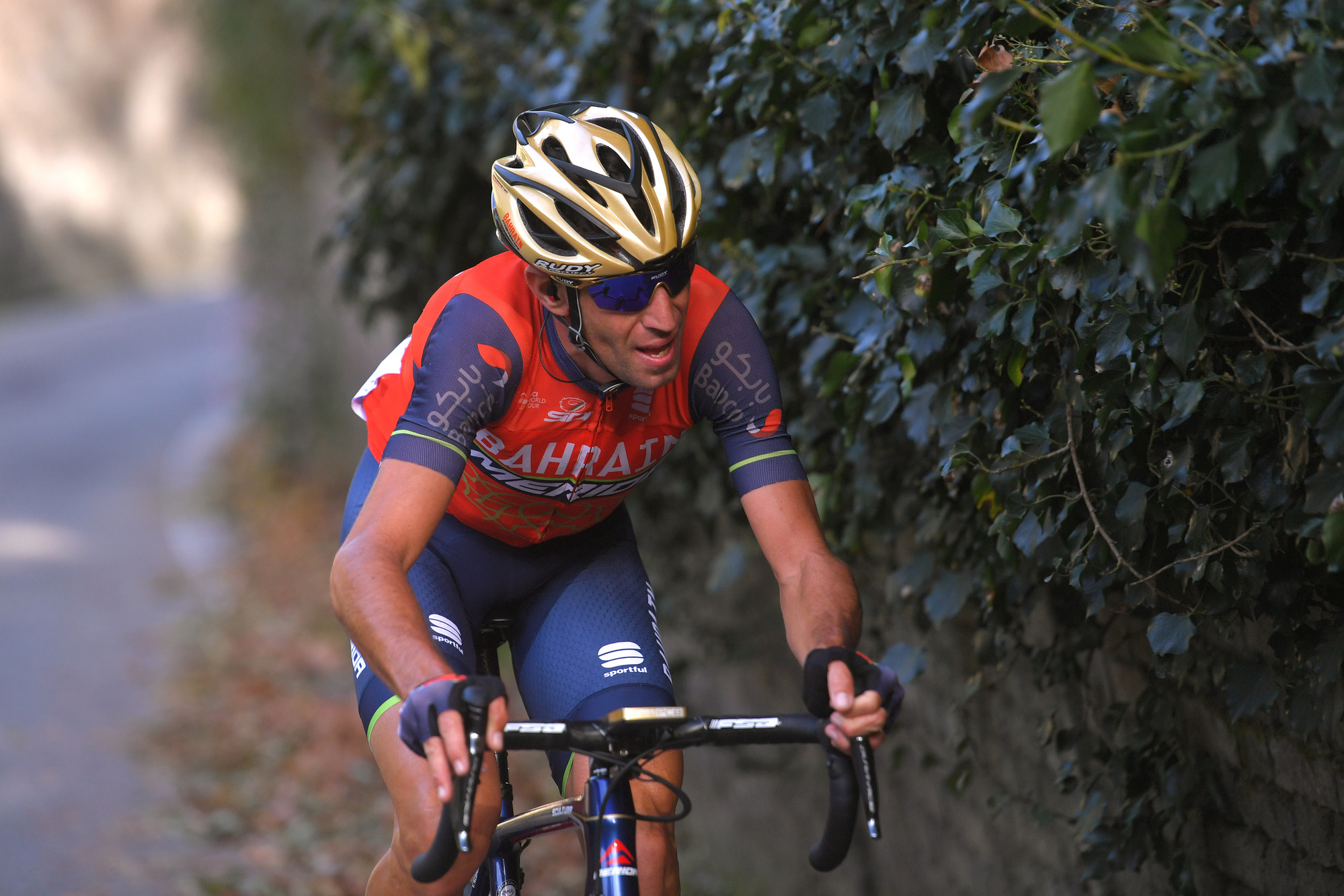
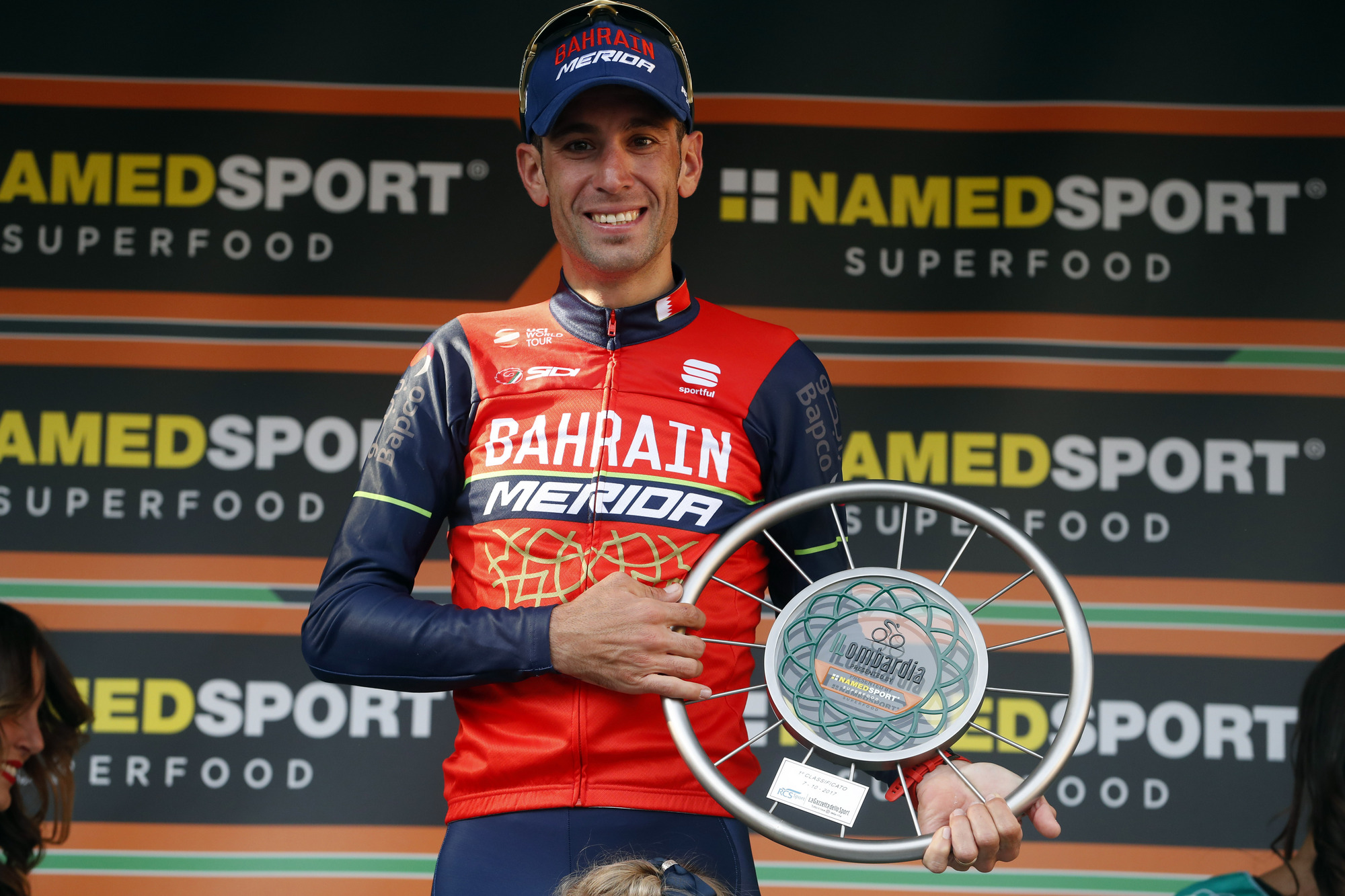
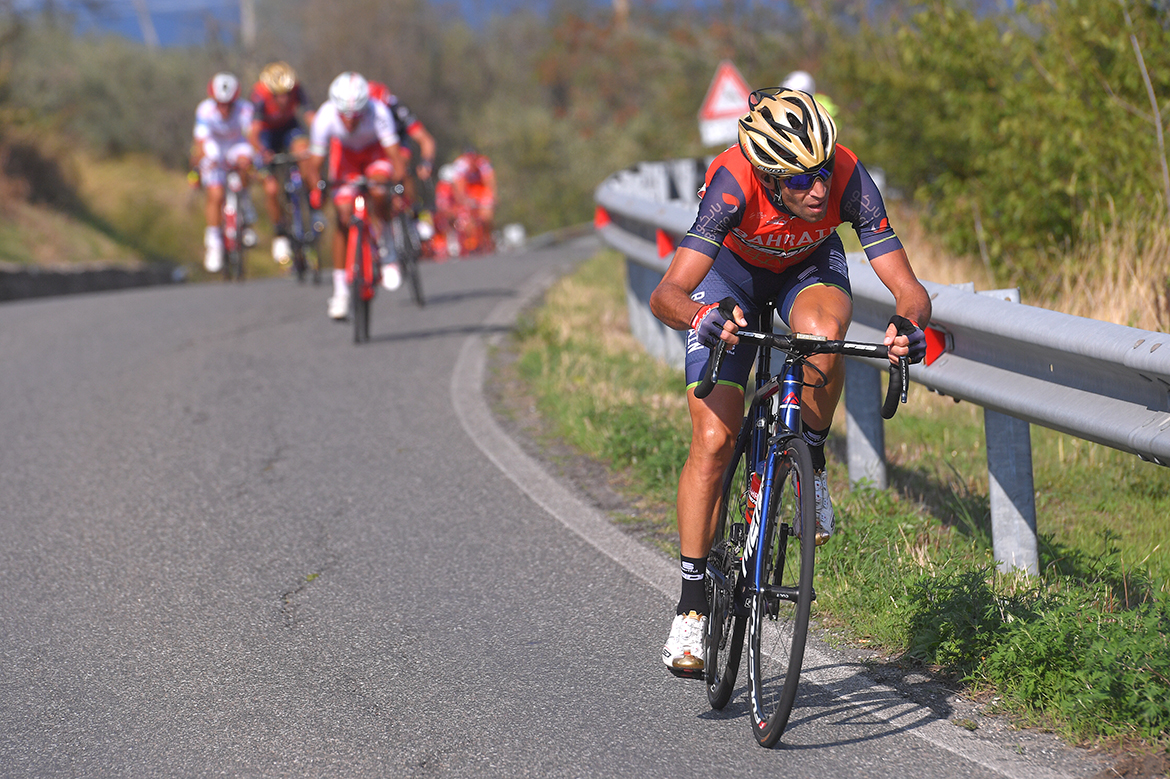
Vincenzo Nibali has told Cyclingnews that he agrees with the idea of a salary cap in professional cycling to reduce the dominance of Team Sky in Grand Tours, firmly believing that Chris Froome would not have won the Tour de France four times without the support of such a dominant team.
Nibali ended his 2017 season with a victory at Il Lombardia last Saturday. He described his first season with Bahrain-Merida as 'very good', insisting he has few regrets and is enthusiastic about what 2018 will bring. He will again race with instinct and natural aggression in the Grand Tours, with the tough world championship course in Innsbruck, Austria, an extra goal for next season.
Nibali finished third in the Giro d'Italia behind Tom Dumoulin and Nairo Quintana and then was second at the Vuelta a Espana behind Chris Froome. He is now one of the most consistent Grand Tour riders in the history of the sport. He won the Giro d'Italia in 2013 and 2016, the Tour de France in 2014 and the Vuelta a Espana in 2010. He has a total of 10 podium finishes, one more than the legendary Fausto Coppi and the same as Gino Bartali. Such is his place in the history of Italian and global cycling.
"Some people have said: 'You had a good season but you didn't win a Grand Tour'. I just shrug my shoulders when I hear that," Nibali tells Cyclingnews during an exclusive end-of-season interview.
"The only thing better than the podium is to win. I was up there fighting for victory every day for 21 days, so I believe that even second or third is a great result."
Nibali argues that the time trials in the Giro d'Italia proved to be a major handicap in his effort against Dumoulin in the Italian race, while Froome and Team Sky proved to be unbeatable at the Vuelta, with their strength in depth allowing them to dominate the racing.
Nibali and Froome locked horns on every key stage of the Vuelta. The Briton gained 57 seconds in the stage 16 time trial but Nibali pulled back 42 seconds the day after on the steep finish of Los Machucos, only to lose 21 seconds on the steep finish to Santo Toribio de Luebana on stage 18 as Alberto Contador ripped up the race in his long, aggressive farewell.
Get The Leadout Newsletter
The latest race content, interviews, features, reviews and expert buying guides, direct to your inbox!
Nibali lost 34 seconds to Froome on the final mountain finish on the Angliru after crashing on the descent to the foot of the climb. He damaged his ribs but fought all the way to the finish to limit his losses and hold onto his second place on the final podium in Madrid.
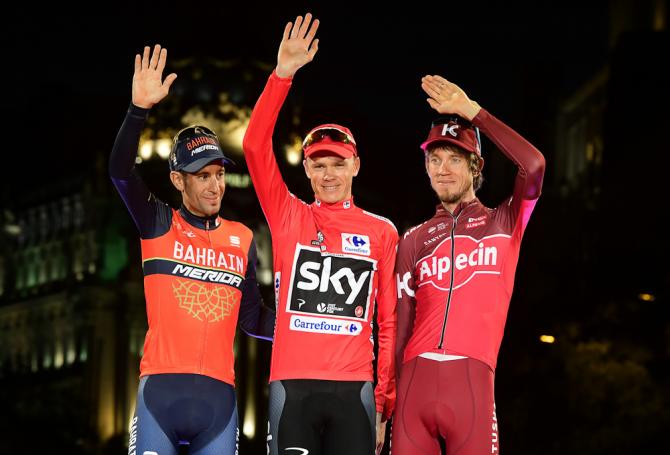
Nibali and Froome have been fierce rivals in Grand Tours in recent years, with the occasional tense moment only tempered by growing respect for each other's talent and success. Nibali describes Froome as a 'nice guy' but that does not stop him sharing his blunt analysis of the Briton's ability and his weaknesses.
"I think the biggest factor between us at the Vuelta was the strength of his team. He was rarely isolated and rarely in trouble. Even when he had a bad day, like on the stage to Los Machucos after the time trial, he still had five teammates with him," Nibali says.
"I don't think Froome would have won the Vuelta without Team Sky. In my opinion, if he hadn't found a team as strong as Team Sky during his career, he wouldn't have won his four Tours."
Nibali lets his opinion hang in the air in silence for a second or two, adding emphasis to his words. He is complimentary about Froome's now famous high-cadence attacks, but he also underlines what he believes are Froome's weaknesses.
"Everybody has weaknesses. Froome's is perhaps when he's isolated. He's not used to being on his own in key moments of the races and so perhaps doesn't know how to best race in situations like that," Nibali suggests.
"We've never seen Froome go on the attack with 100km to go like we've seen Contador do. That's because he doesn't need to. He's got a strong team to help and protect him, so he can always wait until three kilometres to go and then make a move. They set everything up for him and make it easier for him. He's like a sprinter that needs to be led out until 250 metres to go. He then takes over and uses his better position and climbing ability to win. That's his speciality.
"Unfortunately, having a strong team around him all the time clearly makes him much more confident about facing his rivals."
Team Sky's strength in depth and huge budget allows them to field Mikel Landa, Geraint Thomas, Wout Poels, Sergio Henao, Michal Kwiatkowski, Gianni Moscon, Kelly Elissonde, Mikel Nieve and Diego Rosa across its Grand Tour rosters. Nibali had to count on Franco Pellizotti and Giovanni Visconti after illness and injury meant Kanstantsin Siutsou, Ion Izagirre and Ramunas Navardauskas missed much of the season.
Bahrain-Merida has a reported 2017 budget of 17 million Euros, with Nibali taking a big chunk of that as team leader. Team Sky revealed a budget of 31 million Euros for the 2016 season, which explains why they can build such a strong team around Froome and have other big names for the Classics and Grand Tours.
Team Sky's riches were never enough to convince Nibali to join the British team, but he now believes a salary cap would level the playing field between the WorldTour teams.
"Every team has its strengths and weaknesses and I'm not sure Team Sky would be right for me," he says. "There was a moment when I could have moved to Team Sky and it seemed like it was going to happen. But it didn't happen and they've never shown that kind of interest again. I've changed teams several times but I've continued to be successful.
"I think everyone in the sport knows that Team Sky is a super team, that they've got a 30 million Euro budget and that they seem to have bottomless pockets. It's logical that they use it to build such a strong team. I'm not envious of Team Sky but they're affecting the market. Team Sky can sign the world's best climber and the world's best sprinter if they wanted to.
"That's why I think there should be a limit on the number of big-name riders you can have in one team. As a way of putting the teams on an equal financial footing and perhaps to lower the costs of every team, perhaps there needs to a salary cap."
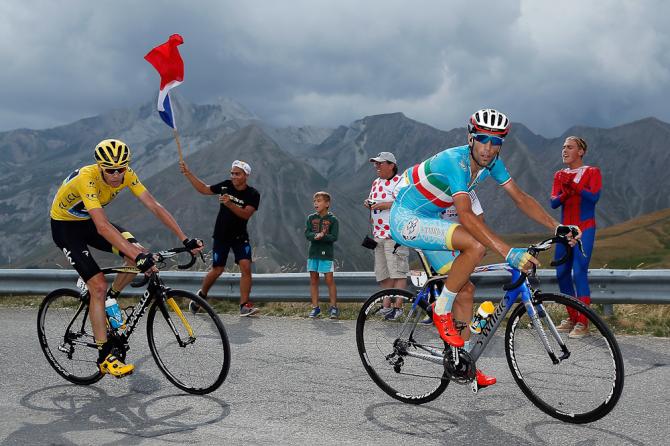
Chris Froome and Vincenzo Nibali at the 2015 Tour de France. (Getty Images Sport)
They keep coming but I keep fighting
Nibali will race one last time this season at the Taiwan KOM Challenge on October 20, tackling the 105km uphill road race with his younger brother Antonio as part of a visit to Asia to meet bike sponsor Merida. It is a final long trip, and with moving houses in Lugano, Switzerland, and his daughter Emma now at school, Nibali will have little time for an end-of-season vacation.
His relaxed nature and satisfaction with his 2017 season indicate he does not need it. He will recover from 81 days of racing with time off the bike and a spell visiting family in Sicily in December.
Nibali will celebrate his 33rd birthday on November 14, but the seasons do not seem to age him. His second place at the Vuelta and his victory at Il Lombardia have left him 'sereno' - with a smile on his face and quiet sense of pride. He is not ready to think about 2018 and says he will only decide and reveal his Grand Tour goals for 2018 after seeing and studying the route of the Giro d'Italia and the Tour de France. He has intimated to RAI television, however, that he is likely to ride next year's Vuelta and aim for stage wins as he builds towards the World Championships in Innsbruck.
"I've battled with the likes of Contador over the years, now I'm battling with the current generation and the next generation like Dumoulin and Chaves. They keep coming, but I keep fighting and will do so again in 2018," he says. "We started the Bahrain-Merida team from scratch, but now we've made it through the first season pretty well. I think my season has been very good and we can be proud of what we've achieved. I'm happy and the team is happy too.
"Trying to get a result in two Grand Tours in the same season is never easy. This year there were also some big rivals in both races, so to finish third at the Giro d'Italia and second at the Vuelta a Espana is the sign of a very good season. It shows I've been competitive throughout the season."
Nibali picks his stage victories at the Giro d'Italia and the Vuelta a Espana as the highlights of the season. He explains how the time trials at the Giro d'Italia made it difficult for him to challenge a very strong Dumoulin, while his lack of a high-power change of pace lost him further time in the Giro and at the Vuelta a Espana.
"Dumoulin is a great time trialist, now he's even the world champion. He had two time trials that suited him and allowed him to gain a significant chunk of time. When you fight to do as well in the time trials, you finish fifth and still lose two and half minutes, it means that he's super strong but that you haven't done too badly," Nibali argues.
"I'm arguably good at every terrain. But I'm perhaps not the best on any of them. I have good and bad days and so can be better than my rivals but also be weaker than my rivals. That's the beauty of Grand Tours."
Despite struggling against the more logical, calculated style of racing imposed by Froome and Team Sky at the Vuelta a Espana and at the hands of Dumoulin at the Giro d'Italia, Nibali is convinced that Grand Tours are far too complex to be won or lost due to simple numbers. His coach, Paolo Slongo, helps him train with an SRM power meter, carefully following a plan, but Nibali races instinctively and emotively, suffering mentally after a bad day and then feeding off the emotional uplift of success.
Nibali followed his instincts on the steep climb of the Blockhaus on stage 9 of the Giro, attacking early in pursuit of Nairo Quintana, only to struggle, fade and be passed by Dumoulin in the final kilometres. He lost 40 seconds, and two days later Dumoulin gained a further 2:07 in the Montefalco time trial.
Coming back from that handicap was virtually impossible, but Nibali has few regrets.
"I was on form, I felt good and so I went for it on the Blockhaus finish. I respond when people attack hard in situations like that. Sometimes it works and sometimes I get it wrong," Nibali says, justifying his instinctive racing.
"It’s nice to understand that people appreciate that about me, but it seems normal to me. I've always raced that way. I know it means I perhaps lose some races but I like to go down fighting."

Stephen is one of the most experienced member of the Cyclingnews team, having reported on professional cycling since 1994. He has been Head of News at Cyclingnews since 2022, before which he held the position of European editor since 2012 and previously worked for Reuters, Shift Active Media, and CyclingWeekly, among other publications.